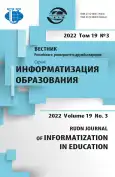Features of using e-resources when learning Chinese as a second foreign language in secondary school
- Autores: Yang G.1
-
Afiliações:
- Yancheng Teachers University
- Edição: Volume 19, Nº 3 (2022)
- Páginas: 171-182
- Seção: PEDAGOGY AND DIDACTICS IN INFORMATIZATION
- URL: https://journal-vniispk.ru/2312-8631/article/view/321301
- DOI: https://doi.org/10.22363/2312-8631-2022-19-3-171-182
- ID: 321301
Citar
Texto integral
Resumo
Problem and goal. A priority aspect of learning Chinese as a foreign language is the use of electronic educational complexes and materials. However, in the context of the complex digitalization of society, special factors appear that should be taken into account when developing and implementing appropriate electronic educational tools. The purpose is to explore the features and potential of e-resources for teaching Chinese as a foreign language in secondary school. Methodology. Theoretical analysis and generalization of the literature are used to describe the conditions for effective teaching of the Chinese language, and the problems of improving the quality of students' educational results. The experiment involved 52 students from the Vyatka Humanitarian Gymnasium. Learning Chinese as a foreign language is supported by StudyChinese.ru, Chinese Boost, Shibushi.ru services. Fisher's criterion was used for statistical data processing. Results. In the experimental group, primary school students used e-resources for comprehensive informatization at all stages of learning Chinese as a foreign language (speaking, listening, reading, writing, intercultural communication and collaboration). An assessment of learning outcomes was made and statistically significant differences in the qualitative changes that occurred in the pedagogical system were revealed. The features of using e-resources for integrated informatization in the study of Chinese as a second foreign language in secondary school are described. Conclusion. The types of activities and interactive exercises in the information environment are formulated, which most effectively work to improve the quality of teaching Chinese as a second foreign language.
Palavras-chave
Sobre autores
Guiyun Yang
Yancheng Teachers University
Autor responsável pela correspondência
Email: 1142845107@qq.com
ORCID ID: 0000-0001-5503-1769
postgraduate student
50 Kaifang St, Tinghu District, Yancheng, Jiangsu, 224002, ChinaBibliografia
- Burnet, N. UNESCO and education: what should they be? Higher Education in Russia. 2008;(11):110-119. (In Russ.) Available from: https://www.elibrary.ru/item.asp?id=11686203 (accessed: 15.04.2022).
- Serostanova NN, Choporova EI. Modern technologies of foreign languages teaching in the age of digitization of education. Modern Problems of Science and Education. 2020;(6):10. (In Russ.) http://doi.org/10.17513/spno.30254
- Obdalova OA, Odegova OV. Intercultural and interlingual communication as a new reality in the context of globalization. Bulletin of Tomsk State University. Philosophy. Sociology. Political Science. 2018;(44):70-81. (In Russ.) http://doi.org/10.17223/1998863X/44/7
- Soboleva EV, Suvorova TN, Zenkina SV, Bocharov MI. Professional self-determination support for students in the digital educational space. European Journal of Contemporary Education. 2020;9(3):603-620. http://doi.org/10.13187/ejced.2020.3.603
- Guruleva TL. Approaches to teaching the Chinese language in the aspect of formation of the intercultural educational paradigm. Language and Culture. 2021;(54):113-130. (In Russ.) http://doi.org/10.17223/19996195/54/7
- Maslovets ОА. System of teaching hieroglyphic writing in the Chinese textbooks: criterial analysis. Bulletin of the Buryat State University. 2017;(7):220-228. (In Russ.) http://doi.org/10.18101/1994-0866-2017-7-220-228
- Shemchuk YuM, Guseva MD. Tendencies of renovation the everyday vocabulary of the language through a borrowing internet-lexem. Language and Culture. 2019;(45): 121-133. (In Russ.) http://doi.org/10.17223/19996195/45/9
- Calafato R. “I'm a salesman and my client is China”: language learning motivation, multicultural attitudes, and multilingualism among university students in Kazakhstan and Uzbekistan. System. 2021;103:102645. http://doi.org/10.1016/j.system.2021.102645
- Passov EI. Education and methodology: from essence to due. RUDN Journal of Russian and Foreign Languages Research and Teaching. 2017;15(4):389-413. (In Russ.) http://doi.org/10.22363/2313-2264-2017-15-4-389-413
- Nadeem MU, Mohammed R, Dalib S. Retesting integrated model of intercultural communication competence (IMICC) on international students from the Asian context of Malaysia. International Journal of Intercultural Relations. 2020;74:17-29. http://doi.org/10.1016/j.ijintrel.2019.10.005
- Tikhonova EV, Potapova AS, Krayder AV. Formation of the foreign language discourse competence with an entrepreneurial track through educational video files in the Instagram application. Language and Culture. 2018;(41):327-338. (In Russ.) http://doi.org/10.17223/19996195/41/20
- Gural SK, Krasnopeeva TO, Smokotin VM, Sorokoumova SN. Goals, tasks, principles and content of individual foreign language educational trajectories based on the latent characteristics of the students. Language and Culture. 2019;(47):179-196. (In Russ.) http://doi.org/10.17223/19996195/47/10
- Kuklina SS, Vladimirova EN. The system of multifunctional exercises for teaching pupils of foreign language listening comprehension. Language and Culture. 2021;(53): 217-237. (In Russ.) http://doi.org/10.17223/19996195/53/14
- Margolis AA, Gavrilova EV, Kuravsky LS, Shepeleva EA, Voitov VK, Ermakov SS, Dumin PN. Measuring higher-order cognitive skills in collective interactions with computer game. Cultural-Historical Psychology. 2021;17(2):90-104. http://doi.org/10.17759/chp.2021170209
- Azarenko YuA, Bi S. International scientific-practical conference “Russia, China, the Great Silk Road: the history of cross-cultural contacts.” Bulletin of the Novosibirsk State University. Series: History, Philology. 2020;19(4):168-172. (In Russ.) http://doi.org/10.25205/1818-7919-2020-19-4-168-172
- Mashanlo ТЕ. Developmental change in the reading measures of Russian students learning Chinese: a longitudinal eye-tracking study. Tomsk State University Journal. 2019;(442):40-51. (In Russ.) http://doi.org/10.17223/15617793/442/5
Arquivos suplementares









